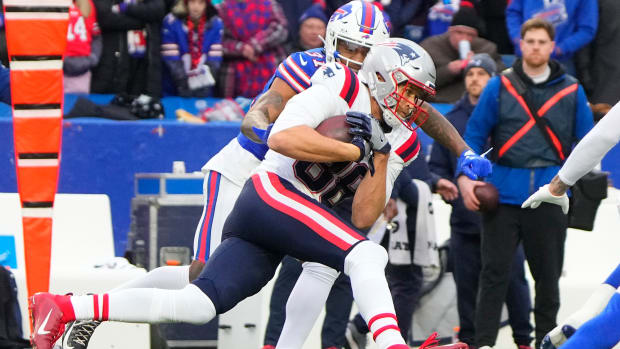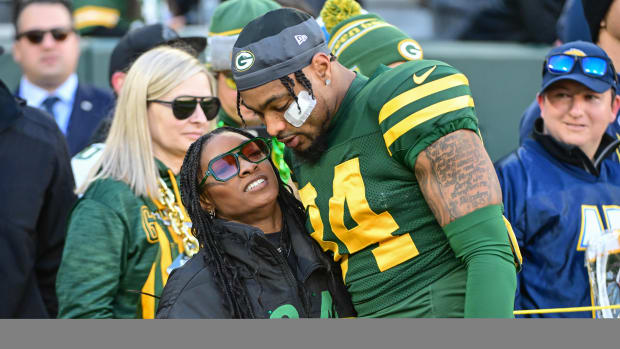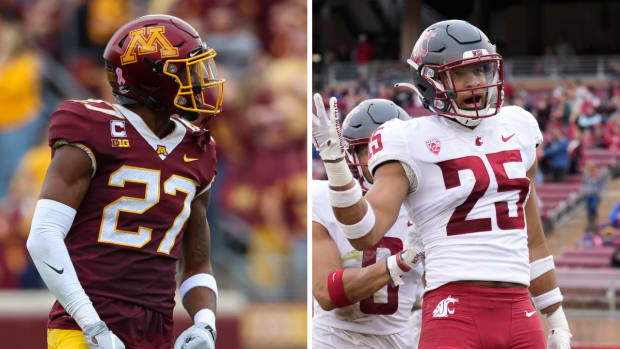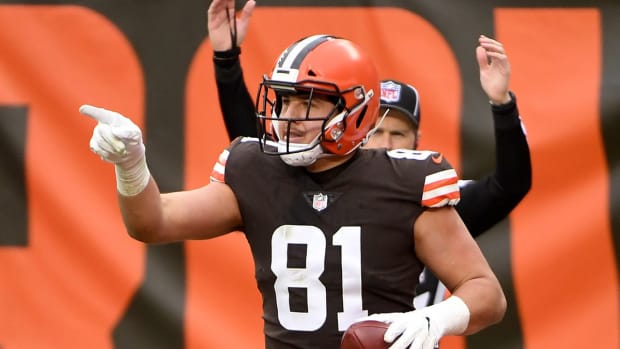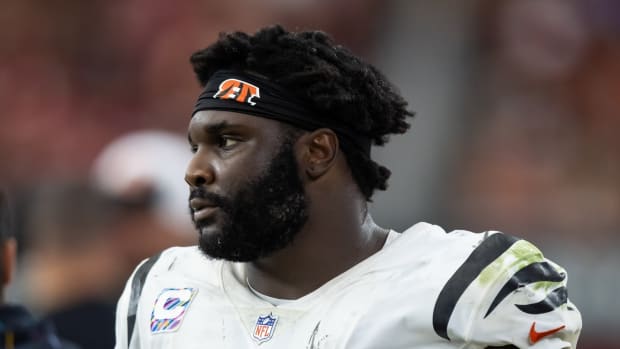Which Rookie Quarterback Will Succeed Most in 2021?
The last time the NFL draft had a quarterback class this supposedly abundant, back in 2018, the fortunes of all five passers taken in the first round were far more dependent on the organizations they were drafted into than their actual skill. Josh Allen began to flourish when paired with an offensive coordinator who created brilliant matchups and a general manager who brought in complementary skill-position talent. Lamar Jackson took off when the Ravens built a system around what he did best and his coach doubled down on that notion, instead of trying to artfully toe the line between what was traditionally acceptable by NFL standards and what was necessary. The Jets continued to behave like the Jets, a franchise that has steamrollered a seemingly unlimited supply of talented young quarterbacking, and now Sam Darnold plays for the Panthers.
Not long ago, 2002 No. 3 pick Joey Harrington did a podcast with The Oregonian and talked about how, while with the Lions, there were prep meetings before games in which his coaches challenged his desire to have blitzers picked up in their protection scheme. Jamarcus Russell, Brady Quinn, Christian Ponder … these are all names we quickly dismiss as busts without considering all the determining factors. For so many of them, they were doomed upon arrival.
Put another way: How many more times do we hear about Tom Brady’s rise from obscurity instead of Bill Belichick’s ability to build one of the NFL’s true meritocracies, devoid enough of destructive internal politics that a sixth-round pick could unseat a quarterback who, at the time, was the highest-paid QB in the league.
With that in mind, we’re going to rank each 2021 first-rounder in terms of potential success in their rookie seasons, but put the weight where it should be: on the shoulders of their organizations. We’ll assign each player a potential success score (PSS) based on factors that we’ll average below. Who really has the best chance at reaching their full potential in 2021?
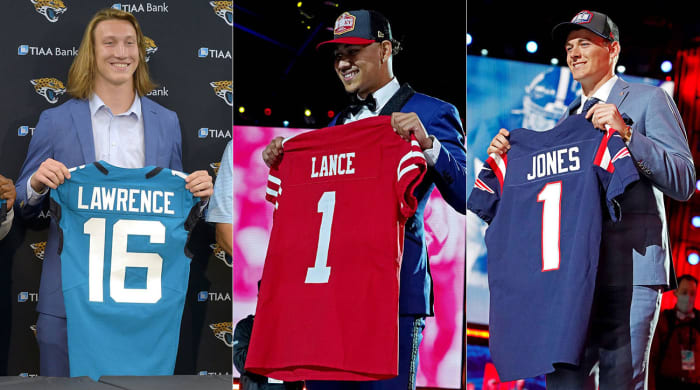
Bob Self/Florida Times-Union/USA TODAY Network (Lawrence); Kirby Lee/USA TODAY Sports (Lance); Kirby Lee/USA TODAY Sports (Jones)
1. Trey Lance (9.25)
Surrounding weapons: 8
Coaching prowess: 9
Organizational health: 10
Offensive line: 10
The 49ers were still a middling offensive team last year, despite a gutting series of injuries. In place for Trey Lance is a willing bridge quarterback (Jimmy Garoppolo), a coach and general manager in harmony with plenty of time remaining on their contracts, and an offensive line that, one could argue, has a top-five player at four out of five spots.
From a technical aspect, it’s not hard to imagine what last year’s relatively static attack could look like now that they will add into the fold a powerful, mobile player who forces defenses to play 11-on-11 football against a Shanahan offense for the first time since he was coordinator of the Washington Football Team. Last year, San Francisco somewhat abandoned its play-action game, and, while the Niners used backfield motion more than any team in football, they likely did so just to inch along their underwhelming set of replacement players. Now, play-action will become integral to their offense in a way we haven’t seen before. Backfield motion, too, will take on a different meaning.
This is a dream scenario for a quarterback, especially since Lance spent time with Shanahan pupil John Beck during the predraft process and already has a handle on the playbook.
2. Mac Jones (9)
Surrounding weapons: 7
Coaching prowess: 10
Organizational health: 10
Offensive line: 9
I’m not buying for a moment any hastily made takes on the decline of the Patriots. Even if one were to believe the secret sauce that made Belichick successful has reached an expiration date, assuming that Mac Jones is doomed as well would be a tremendous disservice to Josh McDaniels, who has quietly amassed an impressive offensive coaching tree with success elsewhere in the NFL. Jones enters the fold with two excellent intermediate weapons in Hunter Henry and Jonnu Smith, which are critical for rookie success. The Patriots’ offensive line has a troika of top-10 players and Trent Brown, who succeeded in New England and returns to the place that made him a top-flight free agent.
And, like Lance, Jones has an able mentor in Cam Newton who can handle early snaps (and, perhaps even more beneficial in Jones’s case, Newton could swallow up various personnel packages and take some facets of the game off Jones’s plate early).
Despite their (relative) lack of success last year, the Patriots were still one of the better under-center, gap run teams in the NFL. Jones, who has a reputation as a careful, accurate, mistake-free player who throws on time and doesn’t rely on any mobility, should check a lot of the boxes McDaniels needs to execute his system.
3. Trevor Lawrence (7.25)
Surrounding weapons: 6
Coaching prowess: 7
Organizational health: 9
Offensive line: 7
Off the bat, I’m sure I will get blowback for ranking the Jaguars as a nine out of 10 on the organizational health scale. The chaotic injection of Tom Coughlin and the sequence of acrimonious exits of players critical to their singular recent playoff appearance are not arguments in my favor. However, the Khan family has been tremendously patient with coaches and general managers, and often sees the big picture when trying to wade through periods of tumult. One gets the impression that they understand how significant drafting Lawrence can be and how little margin for error there really is. The Urban Meyer decision was a complex one, but there is hope that he’ll get the breadth of space coaches need to figure out their mistakes and learn on the job. That said, Meyer has no NFL experience and a staff of coaches that, to be honest, seemed a bit underwhelming at first mention. Had this been an NCAA job, Meyer’s prowess would obviously rate a 10, but there is little sample size demonstrating a clear transition.
Also working in Lawrence’s favor is a better-than-advertised offensive line. Former GM Dave Caldwell left behind a solid core, including the homegrown Brandon Linder and A.J. Cann, each of whom were third-round picks.
Working against Lawrence is the lack of an intermediate weapon. Unless Jacksonville finds itself in the Zach Ertz market all of a sudden, Lawrence will have to make do with the talented and underrated wideout trio of Marvin Jones, D.J. Chark and Laviska Shenault Jr. We’re betting on Darrell Bevell and Brian Schottenheimer to work in fellow first-round selection Travis Etienne in a way we have not seen from running backs in the past, which is hard to wrap our head around at the moment.
4. Justin Fields (6)
Surrounding weapons: 5
Coaching prowess: 7
Organizational health: 6
Offensive line: 6
Matt Nagy is supposedly on the hot seat, however, I would attest that any coach able to lift this roster to two playoff appearances in three years deserves the benefit of the doubt. Obviously, Fields will need to be Nagy’s magnum opus to keep him in Chicago over the long term, but it’s hard not to feel the positive momentum in that regard. Nagy comes from a creative, dynamic arena football background and helped inject the Chiefs with some brilliant concepts before shipping off to Chicago. In the Windy City, Nagy’s creative play-calling during his first year was dismissed as gimmicky despite it being a necessity. It seemed like, early on, Nagy had an understanding of Mitch Trubisky’s limitations and still managed to create something that was somewhat O.K.
Fields will have the benefit of a few good offensive linemen, especially the talented Cody Whitehair at center and the underrated James Daniels at guard. Teven Jenkins may be a steal at left tackle, but Fields’s mobility will help counter any of the early growing pains at the position.
The major question in Chicago is how long of a rope both Ryan Pace and Nagy truly have. Imagine, for example, that the Bears have an underwhelming season in 2021 and ownership decides to move on. All of a sudden, Fields would go from promising player to quarterback barreling toward Darnold territory, where a steady stream of new thinkers enter the fold and complicate the developmental process. Of course, that should not affect his potential 2021 success ratings here.
5. Zach Wilson (5)
Surrounding weapons: 6
Coaching prowess: 6
Organizational health: 3
Offensive line: 5
Joe Douglas’s heavy lifting could eventually alter the organizational health score here, but there is simply no evidence at this point that the Jets’ reactionary, self-defeating ways are completely in the past. Robert Saleh and Mike LaFleur were potentially slam-dunk hires, though it’s always hard to assign a coach a score when they have not called a single game. Working in Saleh’s favor is the fact that he was the motivational underpinning of a 49ers team that made the Super Bowl. While Shanahan’s scheme got a great deal of credit, there are those who believe Saleh’s energy and personality were a necessary Yin to Yang. Now, Saleh is in New York with the scheme and a necessary, personable vibe that can help open up the locker room.
Five might be a generous offensive line score at the moment. Mekhi Bechton is a future anchor at left tackle, and many believe Alijah Vera-Tucker can be a two-position star, though he has not proved that at the professional level. But that leaves more than half of the offensive line still operating as a series of cobbled together parts to protect a quarterback who has had some alarming, pre-2020 struggles when facing a great deal of pressure in the pocket. In a strange way, Fields may have scored slightly better had he landed in New York, given his necessary escapability, though Wilson’s quick release and Aaron Rodgers–esque ability to hit from awkward arm angles will serve him almost as well.
More NFL:
• Orr: Final Draft Grades: Analyzing Every Team's Picks
• Brandt: Rodgers and Packers Still in Fight for Control
• Breer: Inside the Lions' Offseason Overhaul
• Breer: Ron Rivera's Expectations for Year 2 in Washington
































